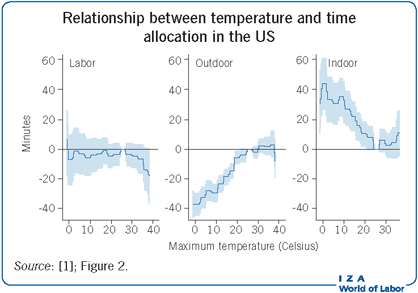Elevator pitch
Understanding the impacts of climate change on time allocation is a major challenge. The best approach comes from looking at how people react to short-term variations in weather. Research suggests rising temperatures will reduce time spent working and enjoying outdoor leisure, while increasing indoor leisure. The burden will fall disproportionately on workers in industries more exposed to heat and those who live in warmer regions, with the potential to increase existing patterns of inequalities. This is likely to trigger an adaptation, the scope and mechanisms of which are hard to predict, and will undoubtedly entail costs.
Key findings
Pros
Time spent working only decreases for very high temperature events, which rarely occur, though the effect is strong for workers in high-exposure industries.
Up to 27°C, time spent outdoors generally increases with temperature.
Higher winter temperatures may increase time spent on outdoor leisure activities, which bring people more happiness, and are generally more active and thereby healthier.
Men have been found to work more on rainy days while women’s labor supply is fairly stable.
People, especially those who live in areas with hotter summers, are likely to adapt to changing climate and may thereby avoid significant decreases in well-being.
Cons
Predicting people’s responses to climate change is inherently difficult.
Studies have mainly focused on the US and Germany, but climate change is a worldwide phenomenon and results may not be generalizable to other countries.
Relatively little is known about how time allocation is affected by weather volatility or extreme weather events.
Warmer summer temperatures are likely to reduce well-being by shifting activities indoors and to have a negative effect on labor productivity.
The scope and mechanisms of the adaptation to climate change are hard to predict and entail costs.
